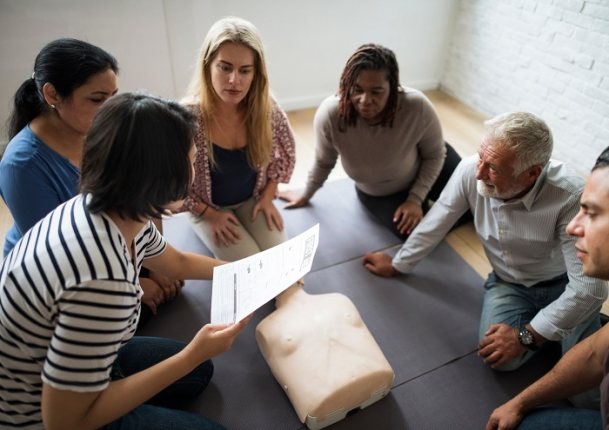Are you training for your CPR skills test and feeling the pressure? Are you anxious about not being able to do well and ending up failing? Fear not!
With the right preparation and mindset, you can face this lifesaving challenge with calm and confidence. Whether you’re a childcare provider, a healthcare professional, or just someone passionate about first aid, acing your CPR exam is a crucial milestone.
Here’s how you can tackle it head-on. Continue reading!

Table of Contents
Master the Basics
Before you even step into the training room, ensure you’ve got a solid grasp of the basics. This means understanding the CPR process and the steps involved-from recognizing an emergency to using an AED.
Reviewing the guidelines provided by the American Heart Association (AHA) or other recognized organizations is key. Refresh your memory on compression-to-ventilation ratios and the correct method for opening an airway.
Utilize all available resources such as first aid training manuals and enroll in online certifications like the one found at https://cprcertificationnow.com. Remember, the more you revise, the more confident you’ll feel.
If possible, practice with a CPR manikin to mimic the actual test conditions. Familiarity breeds confidence, and as the saying goes, practice makes perfect!
Stay Informed and Agile
During the test, it’s essential to stay flexible and adapt to the situation. You might have a prepared approach in mind, but if the scenario is different, you need to be ready to adjust your tactics.
Listen carefully to the instructions provided and assess the situation. Your response should be appropriate and effective.
Real life doesn’t always follow textbooks, and your ability to remain calm and think on your feet will be tested. Your training should focus on the application of skills, not just rote learning.
Keep in mind that each situation is unique. The crucial skill is responding thoughtfully to the needs of the victim at that moment.
Handling the Nerves
It’s common to experience nerves during a test, especially when the well-being of a hypothetical patient is in your hands. To calm those jitters, practice relaxation techniques like deep breathing or progressive muscle relaxation.
Visualize a successful outcome and the steps you’ll take to get there. Positive self-talk can also work wonders.
Remind yourself of your preparations and the knowledge you’ve gained. Tell yourself that you’re ready for the challenge.
Another helpful tip is to have a support network-whether it’s a study group, instructor, or friend. You can share your concerns and receive encouragement.
Post-Test Reflection
After the test, take some time to reflect on your performance. Identify what you did well and what you can improve upon.
If you make any mistakes, don’t be too hard on yourself. Learning is a continuous process, and each experience, even a test, is an opportunity to grow.
Request feedback from your certified trainer or colleagues. This insight can be immensely valuable and will guide your further preparations. Use this information to fine-tune your CPR skills and ensure that you’re even more prepared for the real world.
Mastering Your CPR Skills Test
Remember, CPR is a critical skill that everyone should be familiar with, but the real test is having the courage to use it in a real emergency. Stay committed to your training, and you will be a valuable asset in any crisis.
The more confidently you approach your CPR skills test, the better equipped you’ll be to save lives. Keep studying, keep practicing, and most importantly, keep calm!
Did you like this guide? Great! Please browse our website for more!




